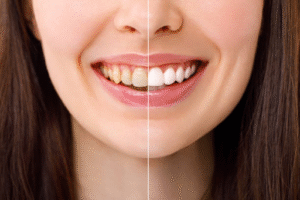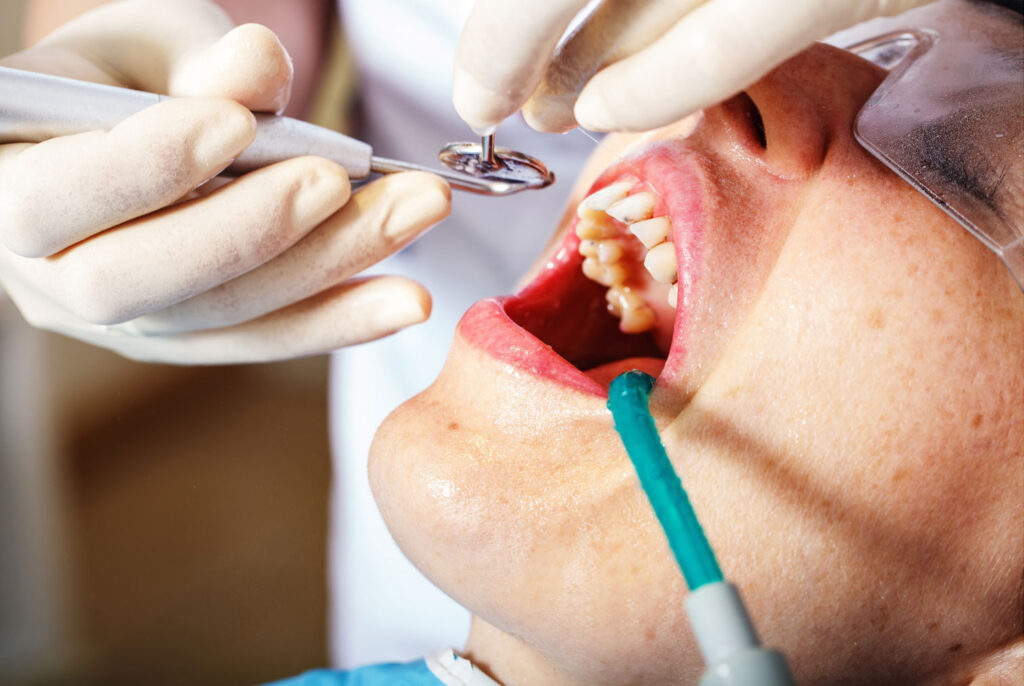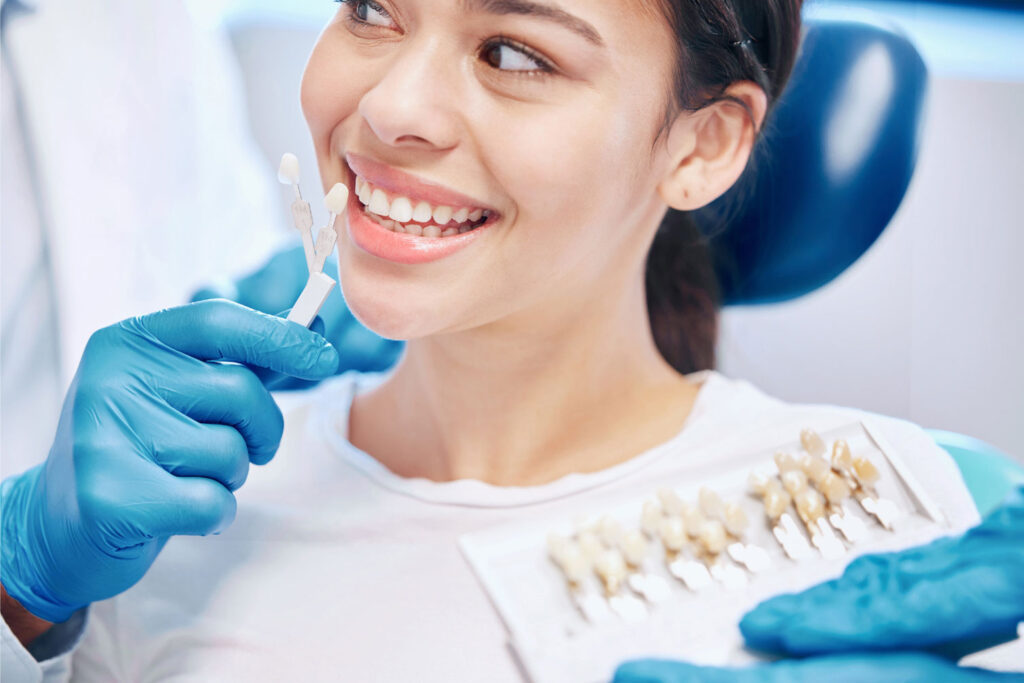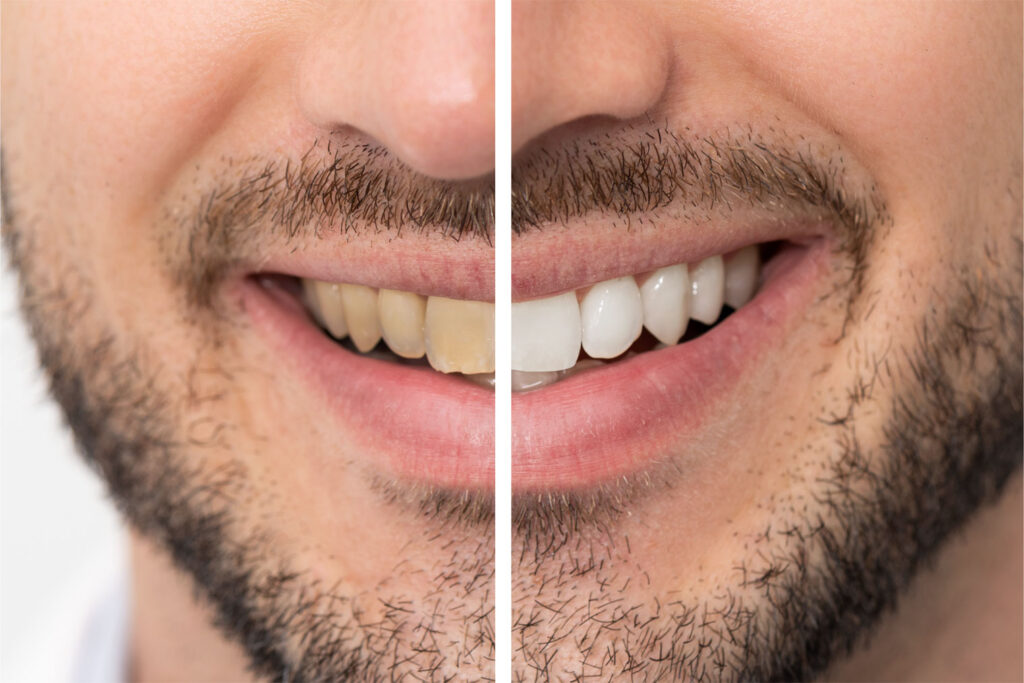
The short answer to “Can teeth still be yellow even if you brush daily?” is a resounding “yes!” It’s easy to assume that if you’re diligently brushing, your teeth should be pearly white. However, the reality is that several factors beyond your daily brushing routine can contribute to yellow teeth despite brushing. It’s a common frustration, and at Smiles for Health DDS, we want to help you understand why this happens and what causes discoloration with regular brushing.
Here’s why your teeth might still be yellow even with daily brushing:
- Extrinsic Staining (Surface Stains): Even if you brush regularly, certain foods and drinks can leave color particles on the outermost layer of your teeth, the enamel. These are called extrinsic stains. Think of it like a light film that builds up over time. While brushing helps remove some of it, persistent consumption of highly pigmented items can still lead to gradual yellowing that your toothbrush alone can’t fully combat. We often see this with regular coffee or tea drinkers.
- Enamel Thinning (Intrinsic Yellowing): This is a big one. The natural color of your teeth actually comes from the dentin, the layer beneath the enamel. Dentin is naturally yellowish. Enamel, which is white and translucent, covers the dentin. As we age, or due to various factors, our enamel can naturally wear down or thin out. When this happens, more of that yellowish dentin shows through, making your teeth appear more yellow. This isn’t about surface stains; it’s about the underlying tooth structure, and no amount of brushing will change it.
- Genetics: Believe it or not, the natural shade of your teeth is largely determined by genetics. Some people are simply born with naturally whiter or naturally more yellowish enamel. If your parents have naturally yellow-tinted teeth, you might too, regardless of your brushing habits.
- Medications: Certain medications, especially some antibiotics taken during childhood (like tetracycline), can cause intrinsic staining that leads to permanent discoloration. Other medications, like some antihistamines or blood pressure drugs, can cause dry mouth, which indirectly increases the risk of stain retention and decay.
- Trauma: A tooth that has experienced trauma (even a small, old injury) can change color over time as a result of internal changes to the tooth’s pulp or dentin. This usually affects only one tooth.
- Fluorosis: While fluoride is beneficial for teeth, excessive exposure to fluoride during tooth development (in childhood) can lead to a condition called fluorosis, which can cause white, brown, or yellow spots/streaks on the enamel.
- Restorations: Old dental fillings or crowns might discolor over time, particularly if they are made of older materials, contributing to an uneven yellow appearance.
So, while brushing is crucial for removing plaque and preventing decay, it might not be enough to tackle all causes of yellow teeth. Understanding these factors is the first step in addressing why are my teeth yellow when I brush them everyday. Our team at Smiles for Health DDS can assess the cause of your discoloration during your exams and cleanings and recommend the best course of action for your wellness dentistry.
What Foods or Drinks Cause Yellowing Despite Brushing?
You might be asking, “Why are my teeth yellow when I brush them everyday?” even if you’re a diligent brusher. The answer often lies in your diet! Many of our favorite foods and drinks contain chromogens (intensely pigmented compounds) or strong acids that can cling to or erode tooth enamel, leading to yellow teeth despite brushing. It’s a common culprit for discoloration with regular brushing. At Smiles for Health DDS, we often discuss dietary habits as a key factor in maintaining a bright smile.
Here’s a list of common foods and drinks that cause yellowing despite brushing:
- Coffee: This is one of the most notorious culprits. Coffee contains tannins, which are chromogens that easily attach to tooth enamel, causing deep yellow or brown stains over time. Even if you brush shortly after, regular exposure builds up.
- Tea: While often seen as a healthier alternative to coffee, tea (especially black tea) can be just as bad, if not worse, for staining due to its high tannin content. Herbal and green teas can also cause stains, though often a lighter, grayish tint.
- Red Wine: The deep red color, combined with tannins and acidity, makes red wine a powerful tooth stainer. It creates an ideal environment for stains to stick to your enamel.
- Dark-Colored Juices and Sodas: Grape juice, cranberry juice, and dark sodas are highly pigmented and often very acidic. The acidity softens enamel, making it more porous and susceptible to staining from the chromogens.
- Berries: Blueberries, blackberries, cherries, and pomegranates are packed with vibrant colors that can leave behind significant stains on your teeth. While healthy, their pigments can be stubborn.
- Tomato-Based Sauces: Marinara, ketchup, and other tomato-based sauces are highly acidic and brightly colored, allowing pigments to easily adhere to softened enamel.
- Curry and Turmeric: These popular spices have intense yellow pigments that can readily stain tooth enamel, especially with frequent consumption.
- Balsamic Vinegar: Its dark color and high acidity make it a strong staining agent for your teeth.
- Sports Drinks: Many sports drinks are highly acidic, which erodes enamel and prepares it for staining from other foods and drinks. They often also contain dyes.
- Candy and Sugary Treats: While not directly staining, sugary foods promote the growth of acid-producing bacteria. The acids then erode enamel, making your teeth more prone to staining from other sources.
It’s not about cutting these foods out entirely, but being mindful. Rinsing your mouth with water immediately after consuming them, drinking through a straw (for beverages), and practicing excellent oral hygiene are good strategies to minimize discoloration with regular brushing. Our team at Smiles for Health DDS can provide tailored advice on diet and teeth whitening options during your next visit. To explore effective solutions for persistent stains, contact us today!
Is Your Brushing Technique Actually Causing the Problem?
You’re faithfully brushing every day, yet you’re still asking, “Why are my teeth yellow when I brush them everyday?” While diet, genetics, and enamel thinning are common reasons for yellow teeth despite brushing, it’s also possible that your brushing technique itself could be contributing to the problem, hindering your efforts to achieve proper discoloration with regular brushing. This might sound counterintuitive, but at Smiles for Health DDS, we sometimes see patients whose diligent efforts are inadvertently working against them.
Here’s how your brushing technique might actually be causing the problem:
- Brushing Too Hard (Abrasive Brushing): Many people think harder brushing means cleaner teeth, but it’s often the opposite for enamel health. Brushing too aggressively, especially with a medium or hard-bristled toothbrush, can actually wear away your enamel. As the protective white enamel layer thins, the yellowish dentin underneath becomes more visible, making your teeth appear yellow. This is a common culprit behind yellow teeth despite brushing.
- Solution: Always use a soft-bristled toothbrush and use gentle, circular motions. Think of massaging your teeth and gums, not scrubbing them.
- Using a Worn-Out Toothbrush: An old, worn-out toothbrush with frayed bristles is ineffective at cleaning and can even be abrasive. Its bristles lose their ability to properly remove plaque and surface stains, leading to their accumulation.
- Solution: Replace your toothbrush every 3-4 months, or sooner if the bristles are visibly frayed.
- Not Brushing Long Enough or Thoroughly: Brushing for less than two minutes, or missing certain areas, means plaque and stain-causing particles are left behind. These can then contribute to surface stains.
- Solution: Brush for the recommended two minutes, twice a day. Pay attention to all surfaces of your teeth – front, back, and chewing surfaces.
- Skipping Flossing: Brushing alone only cleans about 60% of your tooth surfaces. Food particles and plaque left between your teeth and along the gum line by skipping flossing can contribute to discoloration in those areas and lead to decay, which can also appear yellow or brown.
- Solution: Floss at least once a day to remove hidden plaque and food debris.
- Using Abrasive Toothpaste: Some “whitening” toothpastes contain abrasive particles that can be too harsh for daily use, slowly wearing down enamel over time and exposing the yellow dentin.
- Solution: Choose a non-abrasive fluoride toothpaste, and consult us at Smiles for Health DDS for whitening toothpaste recommendations.
If you’re asking, “Why are my teeth yellow when I brush them everyday?” and suspect your technique might be at fault, our team at Smiles for Health DDS can help. During your next exams and cleanings appointment, we can review your brushing technique and provide personalized tips to improve your oral hygiene and tackle discoloration with regular brushing, ensuring your efforts contribute to your overall wellness dentistry goals. To refine your brushing technique and achieve a brighter smile, schedule an appointment with our experts!
Do Genetics or Aging Contribute to Yellow Teeth?
You’ve been diligently brushing, but still find yourself asking, “Why are my teeth yellow when I brush them everyday?” We’ve talked about diet and even your brushing technique, but it’s important to also consider factors beyond your immediate control. Yes, genetics and the natural aging process play a significant role in why you might have yellow teeth despite brushing. At Smiles for Health DDS, we often explain that some discoloration with regular brushing is simply a part of life, but that doesn’t mean you’re stuck with it. If you’re curious about your genetic predispositions or how aging might affect your smile, contact us for an informed discussion.
Here’s how genetics and aging contribute to yellow teeth:
- Dentin Exposure and Enamel Wear (Aging):
- The Role of Enamel and Dentin: Your tooth is made up of several layers. The outermost layer, enamel, is the hard, white, translucent substance you see. Underneath the enamel is dentin, which is naturally yellowish or brownish. As we age, our enamel naturally starts to wear down. This isn’t necessarily due to poor brushing, but simply years of chewing, biting, and everyday wear and tear.
- More Dentin Shows Through: As the enamel thins, more of that naturally yellow dentin starts to show through. This makes your teeth appear more yellow over time, even if the enamel itself isn’t stained. This is a primary reason for yellow teeth despite brushing that is completely natural.
- Natural Changes in Dentin (Aging):
- Dentin Continues to Grow: Unlike enamel, dentin continues to grow and expand throughout your life. As new dentin forms, it can become denser and darker, contributing to a more pronounced yellowish hue from within the tooth. This internal change means that even if your enamel remains thick, the underlying color can still make your teeth appear more yellow.
- Genetics:
- Inherent Tooth Shade: Just like hair color or eye color, the natural shade of your teeth is largely determined by your genes. Some people are simply born with naturally whiter, brighter enamel, while others have enamel that is a naturally thicker or thinner, or a dentin layer that is inherently more yellowish. This means that even with perfect oral hygiene, your teeth might not be as dazzling white as someone else’s.
- Enamel Thickness and Translucency: Your genetic makeup can influence the thickness and translucency of your tooth enamel. Thicker, more opaque enamel will naturally appear whiter, as it better masks the underlying yellowish dentin. Thinner or more translucent enamel will allow more of the dentin’s color to show through, leading to a more yellowish appearance.
So, while diligently brushing is vital for oral health, it cannot reverse genetic predispositions or the natural effects of aging on your tooth structure. Understanding these factors can help you adjust your expectations and explore appropriate solutions for discoloration with regular brushing. At Smiles for Health DDS, our team can assess the underlying causes of your yellow teeth during your exams and cleanings and guide you toward effective teeth whitening options or other cosmetic dentistry solutions.
Are Whitening Toothpastes or Mouthwashes Effective?
You’re wondering, “Why are my teeth yellow when I brush them everyday?” and perhaps you’ve already turned to over-the-counter whitening toothpastes or mouthwashes, hoping for that bright smile. While these products can play a role, it’s important to understand their limitations. They can help with yellow teeth despite brushing, but they don’t always deliver the dramatic results some people expect. At Smiles for Health DDS, we believe in realistic expectations and recommending what truly works for achieving lasting discoloration with regular brushing.
Here’s what whitening toothpastes and mouthwashes can and can’t do, along with alternatives that work better:
- Whitening Toothpastes:
- What they can do: Most whitening toothpastes work by containing mild abrasives (like silica) or chemical agents (like blue covarine) that physically scrub away or optically alter surface stains (extrinsic stains) caused by food and drink. They are generally effective at removing new surface stains and maintaining existing whiteness.
- What they can’t do: They do not change the intrinsic (internal) color of your teeth. They cannot bleach the dentin layer, nor can they magically rebuild thinned enamel. If your yellow teeth are due to genetics, aging, or internal factors, a whitening toothpaste will have very limited impact. They are also often too abrasive if used improperly, potentially contributing to further enamel wear.
- Whitening Mouthwashes:
- What they can do: Some whitening mouthwashes contain low concentrations of hydrogen peroxide or other mild whitening agents. They might help reduce very light surface stains with consistent, long-term use.
- What they can’t do: Their contact time with your teeth is very brief, making them far less effective than toothpastes or professional treatments. They are mainly designed for maintenance rather than significant whitening.
- Why You Still See Yellow Teeth Despite Brushing (with these products): If your yellowing is due to enamel thinning exposing dentin, or deep intrinsic stains from medications or trauma, these superficial products won’t make a noticeable difference. They are simply not strong enough to penetrate the tooth structure to bleach it from within.
- Alternatives That Work Better:
- Professional : This is by far the most effective way to lighten the natural shade of your teeth. Professional treatments use higher concentrations of hydrogen peroxide or carbamide peroxide, applied safely under dental supervision. This active ingredient penetrates the enamel and breaks down stain molecules within the tooth. We offer safe and effective whitening options at Smiles for Health DDS that deliver real results for discoloration with regular brushing.
- Custom Whitening Trays: We can provide custom-fitted trays and professional-grade whitening gel for at-home use. These trays ensure the gel makes even contact with your teeth and stays put for optimal effectiveness.
- or : For severe intrinsic stains, heavily discolored teeth that don’t respond to whitening, or if your primary concern is also tooth shape or alignment, cosmetic solutions like veneers or dental bonding can provide a completely new, uniformly white appearance. This is part of a comprehensive smile makeover.
If you’re asking, “Why are my teeth yellow when I brush them everyday?” and feel stuck, our team at Smiles for Health DDS can discuss the best options for your unique situation during your exams and cleanings. We can help you achieve a brighter smile as part of your overall wellness dentistry goals. Ready to ditch the drugstore disappointments? Learn about our professional teeth whitening solutions. Feel free to reach out to us if you have any questions!
When Should You Consider Professional Whitening or Cleaning?
You’ve been brushing every day, yet you still grapple with the question, “Why are my teeth yellow when I brush them everyday?” You’ve tried various at-home remedies, but the yellow teeth despite brushing persist. This is often the point where many people start to consider professional help. Knowing when to turn to a dentist for professional whitening or cleaning is crucial for achieving the smile you desire and effectively addressing discoloration with regular brushing. At Smiles for Health DDS, we’re here to guide you on the most effective path.
Here are the signs it’s time for a dental evaluation or professional cosmetic treatment:
- No Improvement with At-Home Products: If you’ve been consistently using over-the-counter whitening toothpastes, strips, or mouthwashes for several weeks or months and see little to no change in your tooth color, it’s a strong indicator that the discoloration is beyond what these products can address. This suggests the yellowing is likely intrinsic (from within the tooth) or very stubborn extrinsic staining.
- Deep, Stubborn Stains: If you consume a lot of coffee, tea, red wine, or other highly pigmented foods, you might develop deep-set surface stains that your regular toothbrush just can’t tackle. Professional cleaning (dental prophylaxis) by our hygienist can remove these tough stains that are impossible to shift at home.
- Desire for Significant Whitening: If your goal is to achieve a noticeably lighter shade, rather than just removing surface stains, professional teeth whitening is the most effective and safest option. Our in-office or custom take-home whitening systems use stronger, professionally supervised agents that penetrate the enamel to truly lighten your teeth from within.
- Uneven Discoloration or Single Dark Tooth: If only one tooth appears significantly more yellow or darker than the others, or if you have uneven blotches, this could indicate an underlying issue like a past trauma, an old root canal, or a failing dental filling. Professional evaluation is necessary to diagnose the cause and recommend targeted solutions like internal bleaching, veneers, or dental crowns.
- Concerns About Enamel Health: If you suspect your enamel is thinning, or if you have increased sensitivity, attempting aggressive at-home whitening could worsen the problem. A professional evaluation at Smiles for Health DDS allows us to assess your enamel health, identify any existing issues like gum recession, and recommend a whitening approach that is safe for your specific oral condition.
- Before Other Cosmetic Procedures: If you’re considering other cosmetic dentistry treatments like dental bonding, veneers, or clear aligners, it’s often best to whiten your teeth first. This allows us to match any new restorations to your desired brighter shade.
Don’t let the frustration of yellow teeth despite brushing diminish your confidence. Our team at Smiles for Health DDS offers a range of effective options for discoloration with regular brushing, from professional cleanings to advanced whitening treatments. During your next exams and cleanings, we can discuss the best plan for your unique needs as part of your comprehensive wellness dentistry journey. To achieve your brightest smile, schedule your professional whitening consultation with us today! We’re just a phone call away!
Frequently Asked Questions
Why are my teeth yellow when I brush them everyday despite good oral hygiene?
Yellow teeth despite brushing can be caused by enamel thinning, genetics, or staining from foods and drinks. Smiles for Health DDS explains these factors and how discoloration with regular brushing can occur.
Can certain foods cause yellow teeth even if I brush regularly?
Yes, coffee, tea, red wine, and berries are common culprits that cause yellow teeth despite brushing. Smiles for Health DDS advises limiting these to reduce discoloration with regular brushing.
Does smoking contribute to yellow teeth despite brushing every day?
Absolutely. Tobacco stains teeth and can cause persistent yellowing. Smiles for Health DDS recommends quitting smoking to improve yellow teeth despite brushing.
Can brushing technique affect why my teeth are yellow when I brush them everyday?
Improper brushing or not brushing long enough can leave stains behind. Smiles for Health DDS stresses proper brushing technique to combat discoloration with regular brushing.
Are yellow teeth always caused by surface stains?
No, sometimes yellowing comes from dentin showing through thin enamel. Smiles for Health DDS highlights this as a less visible but common reason why are my teeth yellow when I brush them everyday.
Can certain medications cause yellow teeth despite brushing daily?
Yes, some antibiotics and medications can discolor teeth internally. Smiles for Health DDS discusses this effect in relation to yellow teeth despite brushing.
Is age a factor in why teeth turn yellow even with regular brushing?
Yes, enamel naturally thins with age, revealing yellower dentin beneath. Smiles for Health DDS explains how aging impacts discoloration with regular brushing.
Can dental restorations affect the appearance of yellow teeth?
Yes, crowns or fillings may not match natural tooth color, influencing overall tooth shade. Smiles for Health DDS advises on managing this in yellow teeth despite brushing.
Does drinking water quality affect yellow teeth despite regular brushing?
Hard water with high mineral content can contribute to surface staining. Smiles for Health DDS recommends water filtration if discoloration with regular brushing persists.
Can enamel erosion cause persistent yellow teeth even with brushing?
Yes, enamel erosion exposes dentin and causes yellowing. Smiles for Health DDS emphasizes protective care to address this cause of yellow teeth despite brushing.
How effective are whitening toothpastes for yellow teeth caused by staining?
Whitening toothpastes can help remove surface stains but may not change deeper discoloration.
Can poor diet contribute to yellow teeth even with good oral care?
Yes, diets high in sugars and acids accelerate staining and enamel wear.
Does frequent snacking affect yellow teeth despite brushing?
Frequent eating increases acid attacks on enamel, worsening discoloration.
Can stress impact tooth discoloration with regular brushing
Stress can reduce saliva, leading to dry mouth and increased staining.
When should I see a dentist about yellow teeth despite brushing every day
If discoloration persists after good oral hygiene, professional evaluation is recommended.






